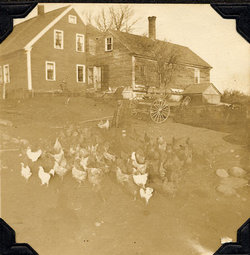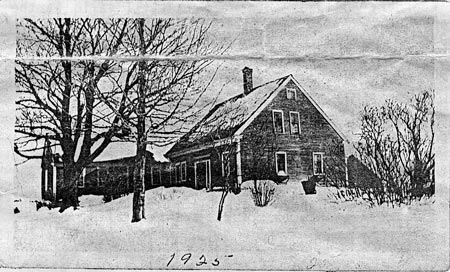"Whereas his late Majesty King James the first for the Advancement of a Colony and Plantation in New England in America..."
Thus begins the grant from the Plymouth Company conveying to "... Edmund Clark of the Plantation called Jones Plantation in the County of Lincoln Commonwealth of Massachusetts Husbandman his heirs and assigns forever a lot of Land lying in said Plantation containing 200 acres..."
Signed before the Justice of the Peace on the 24th day of February AD 1790, this deed is; still valid as the property has passed in a direct line of descendancy. In 1991 the house built on this property by Edmund Clark in 1789, is the house of Frances Clark his great great granddaughter.
Edmund Clark was a son of Jonathan Clark Sr. who lived on the island of Nantucket in Massachusetts in the early1700's. The island was very small and overcrowded. The Clarks learned that 500 acres of land would be given to each man who would settle in Nova Scotia. In 1763, with his wife, sons and daughter and her husband moved there settling on Cape Sable Island. They fished and raised potatoes, and once or twice a year, sailed to Boston in their boat for groceries and supplies.
In 1773, discontented and homesick, the Clarks abandoned their farms and sailed along the coast of Maine as far as the Kennebec River. They sailed up the river to a spot near the present city of Gardiner where they lived during the winter of 1773 and1774. There they met John Jones, a surveyor in the employ of the Plymouth Company. He told them that, in the spring, he would survey a township for the Company and give one half of the land in lots of 200 acres, each, to settlers, who would pay for the surveys.
The Clarks entered into this project and, in March 1774, Jonathan Jr. and Edmund accompanied Jones to what was the Jones Plantation and is now in the town of China. Jonathan Jr. and Edmund settled on the west side of China Lake south of the narrows. Jonathan Sr. with his only unmarried son Ephraim and his daughter Jerusha and her husband, George Fish selected land directly across the lake. Another son, Andrew, decided on the land which is now the village of South China. His house burned in the fire of 1872. The Clarks were neither hunters nor farmers, to begin with, and suffered a great deal during the early years.
Edmund had married Rachel Coffin in 1766 while still in Nova Scotia. Four of their children were born there and three were born in a log house on the west shore of China Lake. In 1789, Edmund built his permanent home, adding an ell in 1829. He and his son Randall were farmers. His son, Elisha, became a lawyer and handled legal affairs on the west side of the lake. He served in the war of 1812. Andrew had a saw mill on Jones Brook in South China. He was an engraver and carved elaborate powder horns during the time of the revolution. Ephraim farmed and had a saw mill on Clark Brook. He set out the first fruit orchard in town. In 1800, Randall Clark and Joseph Webber cleared land and laid out a road on the west side of China Lake which has become part of Route 32.
Since that day, in March 1774, when Jonathan Jr. and Edmund are recorded as having felled the first tree to be cut in China (a large Pine on the west shore of China Lake), the Clarks have made an impact on China's history.
Virginia M. Zulieve
Pres. C.H.S.
"Whereas his late Majesty King James the first for the Advancement of a Colony and Plantation in New England in America..."
Thus begins the grant from the Plymouth Company conveying to "... Edmund Clark of the Plantation called Jones Plantation in the County of Lincoln Commonwealth of Massachusetts Husbandman his heirs and assigns forever a lot of Land lying in said Plantation containing 200 acres..."
Signed before the Justice of the Peace on the 24th day of February AD 1790, this deed is; still valid as the property has passed in a direct line of descendancy. In 1991 the house built on this property by Edmund Clark in 1789, is the house of Frances Clark his great great granddaughter.
Edmund Clark was a son of Jonathan Clark Sr. who lived on the island of Nantucket in Massachusetts in the early1700's. The island was very small and overcrowded. The Clarks learned that 500 acres of land would be given to each man who would settle in Nova Scotia. In 1763, with his wife, sons and daughter and her husband moved there settling on Cape Sable Island. They fished and raised potatoes, and once or twice a year, sailed to Boston in their boat for groceries and supplies.
In 1773, discontented and homesick, the Clarks abandoned their farms and sailed along the coast of Maine as far as the Kennebec River. They sailed up the river to a spot near the present city of Gardiner where they lived during the winter of 1773 and1774. There they met John Jones, a surveyor in the employ of the Plymouth Company. He told them that, in the spring, he would survey a township for the Company and give one half of the land in lots of 200 acres, each, to settlers, who would pay for the surveys.
The Clarks entered into this project and, in March 1774, Jonathan Jr. and Edmund accompanied Jones to what was the Jones Plantation and is now in the town of China. Jonathan Jr. and Edmund settled on the west side of China Lake south of the narrows. Jonathan Sr. with his only unmarried son Ephraim and his daughter Jerusha and her husband, George Fish selected land directly across the lake. Another son, Andrew, decided on the land which is now the village of South China. His house burned in the fire of 1872. The Clarks were neither hunters nor farmers, to begin with, and suffered a great deal during the early years.
Edmund had married Rachel Coffin in 1766 while still in Nova Scotia. Four of their children were born there and three were born in a log house on the west shore of China Lake. In 1789, Edmund built his permanent home, adding an ell in 1829. He and his son Randall were farmers. His son, Elisha, became a lawyer and handled legal affairs on the west side of the lake. He served in the war of 1812. Andrew had a saw mill on Jones Brook in South China. He was an engraver and carved elaborate powder horns during the time of the revolution. Ephraim farmed and had a saw mill on Clark Brook. He set out the first fruit orchard in town. In 1800, Randall Clark and Joseph Webber cleared land and laid out a road on the west side of China Lake which has become part of Route 32.
Since that day, in March 1774, when Jonathan Jr. and Edmund are recorded as having felled the first tree to be cut in China (a large Pine on the west shore of China Lake), the Clarks have made an impact on China's history.
Virginia M. Zulieve
Pres. C.H.S.
Family Members
Advertisement
Records on Ancestry
Advertisement









